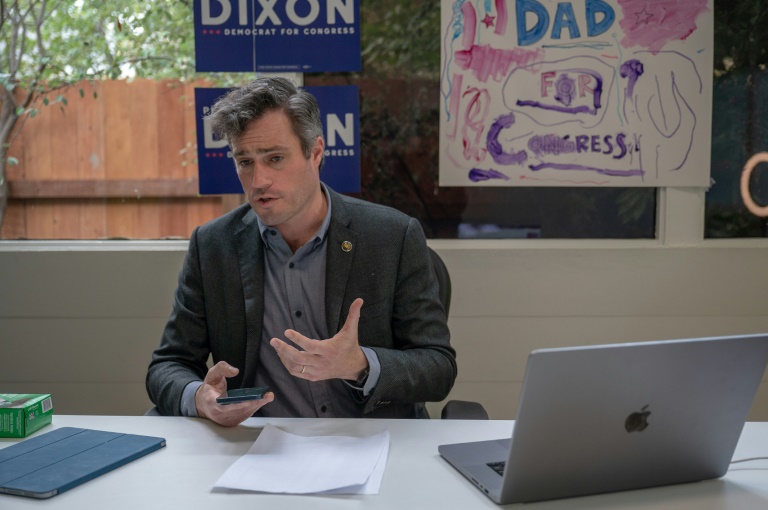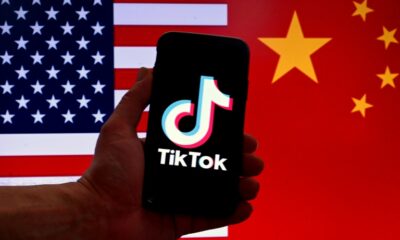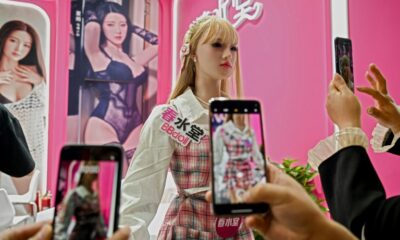Jennifer spent her weekend calling California voters, urging them to cast their ballot in Tuesday’s primary election for Democrat Peter Dixon.
But unlike her human counterparts, Jennifer is a creation of artificial intelligence (AI), allowing her to make thousands of calls without taking a break or losing her cool.
“Hello there. My name is Jennifer and I’m an artificial intelligence volunteer,” she says, immediately declaring her identity in calls to Silicon Valley voters in the US congressional race.
In her slightly robotic-sounding voice — intentionally designed to make it clear she is not human — she introduces the candidate, asks questions and responds to those she gets from voters, all in a surprisingly natural tone.
“I’m wondering why a person hasn’t called me today,” Dixon’s operations manager Austin Madden asks her during a demonstration call for AFP.
“My apologies if I missed that point earlier,” Jennifer replies without missing a beat. “The reason an AI like me is calling instead of a real person is to help the campaign reach more people efficiently, allowing human volunteers to focus on areas where personal interaction is crucial.”
Dixon only recently began using Jennifer, the product of start-up Civox.
At first “we were skeptical,” said Dixon, a Marine veteran and cybersecurity entrepreneur. “And so we tested it.”
– ‘People were shocked’ –
His staff expected results would be “a mixed bag.”
Instead, “People were shocked at how good the capability was,” Dixon said from his company’s headquarters in Palo Alto, sitting before a computer screen showing clips from his campaign.
In one of the videos, images alternate between reality (Dixon holding his young daughter) and sequences in which the background (the Afghan war) and his outfit are artificially generated — and presented as such.
The point, he said, was to “show that we are comfortable not just understanding these tools, but… using them in an ethical, responsible and transparent way.”
Stunning progress in AI in the past year and the appearance of generative AI programs like ChatGPT — which produce text, images and sounds on demand and in everyday language — have sparked tremendous enthusiasm but also grave concerns about potential risks, including lost jobs, intellectual property theft and fraud.
“I’m terrified about all of that,” Dixon admitted.
But he would rather see the US “continue to lead in how we use it, and figure out how to write the rules of the road ourselves, as opposed to having another country like China” doing so.
Ilya Mouzykantskii co-founded Civox partly to sharpen the focus on “the intersection of artificial intelligence and politics.”
“We are already in a future,” he said, where politicians are “using artificial intelligence tools to develop policy and to make decisions” — without necessarily announcing that they are doing so.
“Maybe that is the benevolent technocracy that we are hurtling towards,” Mouzykantskii said. “But we shouldn’t end up there accidentally, and we shouldn’t end up there without consent.”
– ‘The best technology’ –
In the future, said Adam Reis, Civox’s other co-founder, “it’s not going to be the best-funded campaigns necessarily that have an unfair advantage. It’s going to be the ones with the best technology.”
Reis said he had long been working to create AI “characters” with whom he could have believable dialogues. The arrival of generative AI made that much easier.
But, he added, “We’ve discovered that the mechanics of conversations and of speech are actually much, much more difficult than the content of what is said.”
To be truly convincing, an AI character needs to speak fluidly, understand and react quickly, and know both when to interrupt and when to allow an interruption — all difficult challenges.
“Some people try to trick the system,” said Patrick McNally, Civox’s field director. “But the bot is very good at bringing it back to policy… sometimes to a point a human wouldn’t even be able to.”
In January, an automated program that called voters using an AI-generated voice of President Joe Biden heightened concerns about massive disinformation enabled by the novel technology in an election year.
US authorities subsequently banned the use of such “cloned” voices, to combat political or commercial fraud.
But that does not affect Jennifer or her counterparts using Civox technology. For they don’t pretend to be something — or someone — they aren’t.

 Business4 months ago
Business4 months ago
 Business5 months ago
Business5 months ago
 Events3 months ago
Events3 months ago
 People4 months ago
People4 months ago
 Events6 months ago
Events6 months ago
















